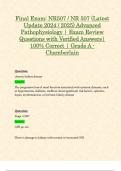Final Exam: NR507 / NR 507 (Latest
Update ) Advanced
Pathophysiology | Exam Review
Questions with Verified Answers|
100% Correct | Grade A -
Chamberlain
Question:
chronic kidney disease
Answer:
The progressive loss of renal function associated with systemic diseases, such
as hypertension, diabetes, mellitus (most significant risk factor), systemic,
lupus, erythematosus, or intrinsic kidney disease
Question:
Stage 1 CKD
Answer:
GFR 90-120
There is damage to kidney with normal or increased GFR
,Question:
Stage 2 CKD
Answer:
GFR 60-89
There is kidney damage with mild decrease in GFR
Question:
Stage 3 CKD
Answer:
GFR 30-59
There is moderate decrease in GFR
* This is a significant phase! GFR below 60- still a chance to improve function
and avoid dialysis.
Question:
Stage 4 CKD
Answer:
GFR 15-29
There is severe reduction in GFR .
Once this stage is reached, progression to the next stage is inevitable, as well
as dialysis or kidney transplant being necessary .
,Question:
Stage 5 CKD
Answer:
GFR <15
Needs dialysis or kidney transplant
Question:
Dialysis and so determining who is the candidate for dialysis
Answer:
Based on symptoms, kidney function, overall health status, individual
circumstances
Question:
Six reasons for dialysis
Answer:
1. Metabolic acidosis. (Low pH)
2. Hyperkalemia, with EKG changes - peaked T waves.
3. Drug toxicity (salicylates, lithium, isopropanolol, methanol, Etheline
glycol).
4. Fluid overload (not responding to diuretics)/ HTN/ pulmonary edema
5. Uremic symptoms - due to nitrogenous waste in bloodstream.
6. Progressive loss of kidney function.
, Question:
Number one cause of ESRD
Answer:
DM + HTN combined
Question:
Why anemia occurs in ESRD
Answer:
Reduce production of erythropoietin, which is responsible for triggering the
production of RBCs, rather than the lack of iron or a reduction in the RBCs
Question:
Symptoms of CKD
Answer:
•Hypocalcemia and hyperphosphatemia
•Anemia
• hyperkalemia With abnormal EKG findings and elevated T waves
• Excess hydrogen ions, causing metabolic acidosis
• Uremia, which can cause pericarditis, encephalitis, bleeding, and increased
risk of infections (the second most common cause of death for end stage renal
disease patients)
• Fluid volume overload-diuretics can be used to stimulate renal function for
patients in stage 1 to 3. If diuretic therapy fails, or if in stage four or five and
dialysis is indicated.




